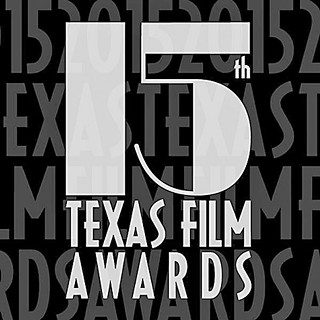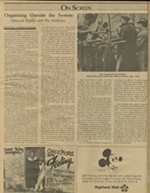L.M. Kit Carson: Film Frontiersman
Texas Film Awards' posthumous inductee
By Louis Black, Fri., March 6, 2015
Kit Carson was an outlaw. This didn't mean he was a film-industry outsider because sometimes he worked far inside. But he wasn't an insider either as he spent more than his fair share of time in the cold. No, in his heart and in his wake, he was an outlaw! A filmmaker, actor, writer, producer, promoter, visionary, con man, artist, tall-tale teller, Carson was always on the run, heading toward the next adventure rather than away from the law. I remember him framed in a John Ford doorway, the light just right, his head tilted back, wearing a black Sergio Leone duster, a rueful grin with a look in his eyes that hinted he knew a whole lot more about what was going on than you. Hell, more than anyone else in the room. And for the most part he did.
Speed talker, master planner, inspired hustler, endless self-promoter, creative gremlin, Carson starred in Jim McBride's David Holzman's Diary; helped McBride remake Jean-Luc Godard's Breathless; birthed the USA Film Festival in Dallas; wrote The Texas Chainsaw Massacre 2 for director Tobe Hooper; co-wrote Wim Wenders' Paris, Texas; mentored directors Guillermo del Toro and Roman Coppola; was involved in countless film projects; and nonchalantly discovered Wes Anderson and those wild Wilson boys, Luke and Owen, as he shepherded Bottle Rocket to the screen. Like any gambler he was always looking for the next high-stakes game, as with any wanderer he was never at home but always just visiting. And along the way, he helped change the face of American filmmaking.
The movie industry has always been driven by buccaneers, the first couple of generations included a lot of immigrant clothing salesmen from New York City, who dressed well but played by nobody's rules except what they could get away with as a standard. They didn't reinvent visual entertainment and launch modern mass media by worrying about decorum. Soon enough, the gray fog of bankers subsumed the industry, but even after that and ever since there have always been the freebooters steering their own course, flying under their own flags.
In every way, Carson was a classic independent American moviemaker – driven by vision, excelling in deal-making, and understanding how to navigate productions. Paraphrasing what Kris Kristofferson's Blackie Buck says about Willie Nelson's Doc Jenkins in Songwriter: "You see, in the [film] business, just like in real life, it's a day-to-day war between the sorry and the soulful, and no rule says the righteous got to win. But I'm putting my money on a con man gypsy badass true-blue legendary bandit hero, and when it's all over, they can say he did it for the love, but he was not above the money."
In 1967, Carson starred in Jim McBride's black-and-white film David Holzman's Diary. Cinema verité was not yet a decade old when McBride tackled the new documentary form head on. An intimate self-portrait by an increasingly troubled, young New York filmmaker named David Holzman, the film pretended to show documentary veracity. In early screenings, one could hear the audible gasp of the audience as the end credits revealed it was a scripted fictional narrative film (it was booed at the San Francisco Film Festival). Made for around $2,500, the film was improvised based on 10 pages of notes authored by filmmaker McBride. Playing Holzman, Carson brought exactly the kind of vitality needed to make the audience buy him as authentic. The film was revolutionary and influential, pushing the boundaries of both documentary and narrative. David Holzman's Diary confronted how movies make meaning through its intimate examination of the assumptive conceit that documentary is inherently a more honest form.
In 1970, Carson founded the USA Film Festival in Dallas with an emphasis on independent films. This was more than a half decade before the launch of the US Film Festival in Utah, which would eventually become Sundance.
In the early Seventies, he was a working journalist at Esquire. An article, "The New Hollywood," in 1974 was the first important chronicling of a group of revolutionary (especially by the industry's standards) younger filmmakers. He went on to fully enshrine himself in the writers' hall of fame when he was sent to interview the actress Karen Black and ended up marrying her. This earned him a special place in the daydreams of the next few generations of writers.
He visited the shoot in South America of fellow wild talent Dennis Hopper's The Last Movie in 1971. Documenting the experience, he made The American Dreamer, a documentary about the then-very-hot Hopper. This hard-to-see work has achieved legendary status.
Collaborating again with writer/director McBride in 1983, Carson co-wrote an audacious, English-language remake of Jean-Luc Godard's Breathless. Starring Richard Gere, the film was far better than anyone expected (and I swear as much as anything inspired Robert Earl Keen's song "The Road Goes On Forever"). Working in Austin, he wrote The Texas Chainsaw Massacre 2 for director Tobe Hooper. Although underappreciated until the film was recut, it was regarded as simply outstanding by those who saw it.
Working from his book Motel Chronicles, writer Sam Shepard carefully crafted the first half of Paris, Texas (1984) with director Wim Wenders. The second half – a free fall in space – received structure and narrative trajectory from Carson, who gets screenplay credit. The film co-starred Hunter Carson, his son. During this time, he also performed juicy roles in Sidney Lumet's Running on Empty, which starred River Phoenix, and a Miami Vice episode.
In the early Nineties, after meeting Guillermo del Toro at a Sundance Lab in Mexico, Carson brought him to Los Angeles, where he hooked him up with Francis and Roman Coppola, profoundly influencing del Toro's life and career. Advising Roman Coppola, Carson helped craft CQ, the 2001 feature in which he also appears.
Bob Wilson, a TV executive in Dallas, asked Carson to come over for dinner to talk his sons out of getting involved in filmmaking. Instead, he encouraged Luke and Owen Wilson and their friend Wes Anderson to head in the opposite direction. Guiding the young filmmakers through the making of their short film "Bottle Rocket," Carson then shopped it around and, with his wife and producing partner Cynthia Hargrave, helped find the money to make it as a feature. The rest is history.
All these years, Carson kept finding young talent, mentoring writers and filmmakers, while also continuing to produce, write, and continue his habit of cinematic innovation. In 2011, using his cell phone to shoot in Africa, he made Africa Diary for the Sundance Channel.
Always chasing the next idea, he eased from acting to writing to producing, while always mentoring. But he was a bandit. Regularly, he would call me up saying he was passing through Austin and really wanted to see me. In fact, he would insist, he needed to see me. Then he would stop by the Chronicle and make hundreds of photocopies, send faxes, and place phone calls all around the globe. As often as not, he'd leave without even sticking his head in my office. But for those of us privileged to know him, it didn't feel like you were getting taken. No, far from it; there was something very special going on in Carson's world all the time. His visits allowed us to watch a true visionary hustler and artist at work, something I felt honored to witness and now miss since his death last October.
The Austin Film Society is screening David Holzman's Diary, along with Carson's short film "Direction Man" on Wed., March 11, 8pm (corrected time) at the Marchesa Hall & Theatre. Friends of the late L.M. Kit Carson will pay tribute to the filmmaker onstage. Bottle Rocket will screen there on Fri., March 6, at 7pm.










